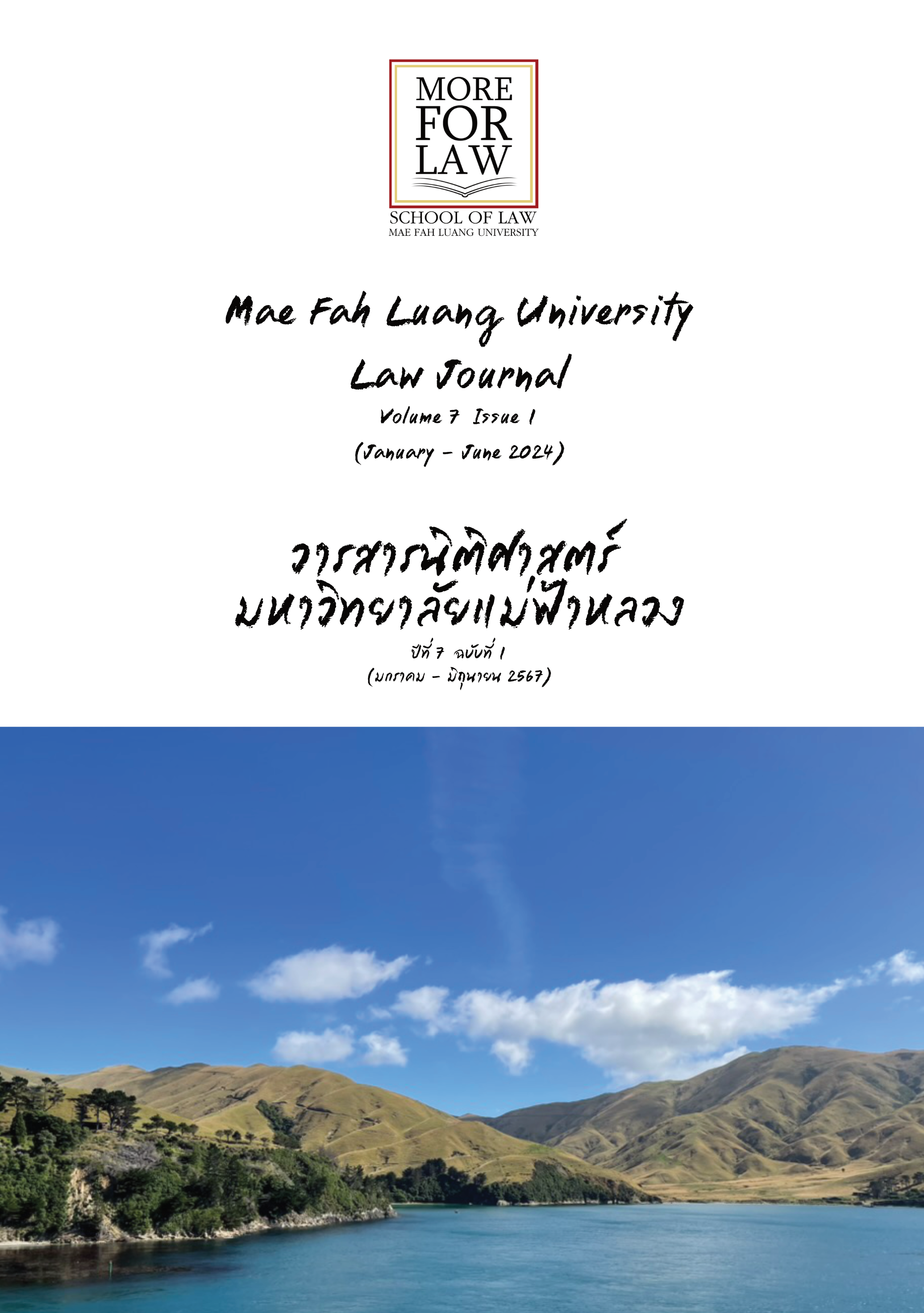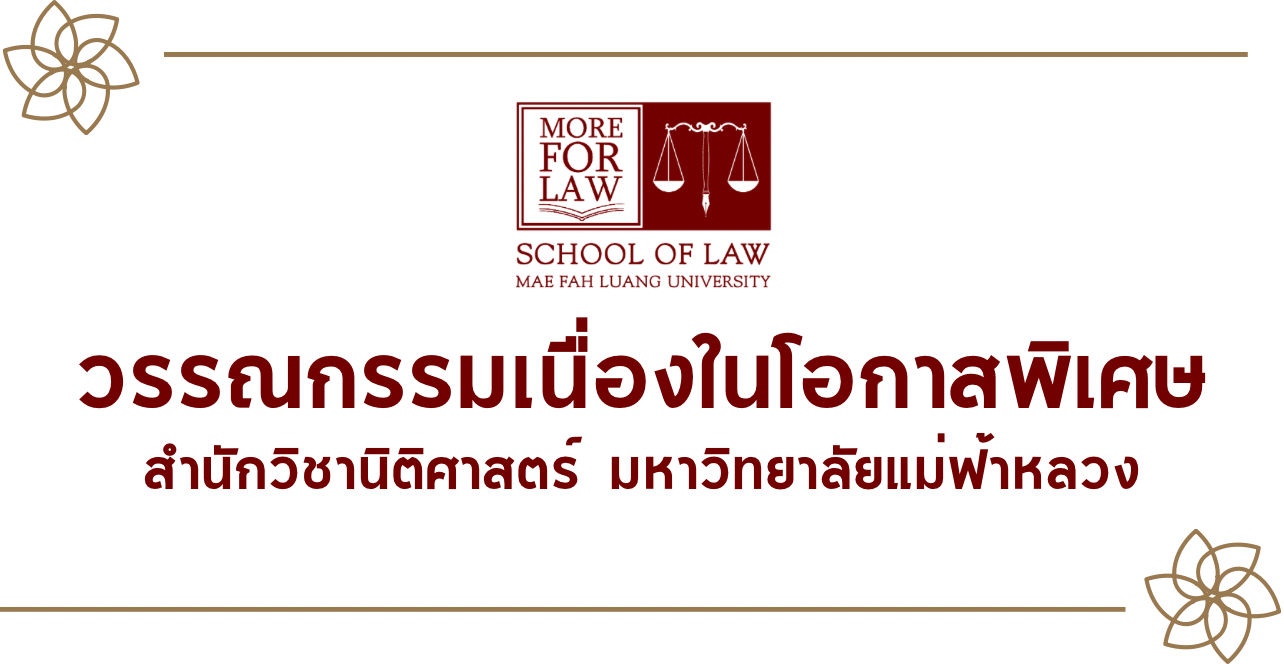The Division of Marital Property Between Spouses by Court Decision: An Observations in A Comparison of Australian Laws
DOI:
https://doi.org/10.14456/mfulj.2024.9Keywords:
Division of Marital Property, Common Property, Equitably Distribution, Heteronormativity, Gender Roles, Patriarchy, Unpaid Care WorkAbstract
This article is based on the author's study of the family law principles in Australia, specifically focusing on their unique approach to dividing marital property. One noteworthy aspect is that the judge’s discretionary power to allocate property unequally between husband and wife whereas an equal split may not be just and equitable in certain circumstances. One significant factor is the concept of financial contributions, to the marriage, which encompasses an unpaid care work like homemaking and child-rearing when evaluating a contribution to the marital property. Moreover, the concern of future needs, particularly post-divorce future welfare of children, must be considered and clearly outlined in the Australian law.
This stands in contrast to the property division principles in the current Thai legal framework for divorce cases. In Thai divorce judgments, the judge is obligated to grant an equal division of common property. The article aims to explore these differences, raising the question of whether the principle of equal division, without accounting for other factors or circumstances, is fair or not.
Downloads
References
ประสพสุข บุญเดช, คำอธิบายประมวลกฎหมายแพ่งและพาณิชย์บรรพ 5 ว่าด้วยครอบครัว, พิมพ์ครั้งที่ 17 (กรุงเทพมหานคร: สำนักอบรมศึกษากฎหมายแห่งเนติบัณฑิตสภาพ, 2552)
พิจารณาปฤชามาตย์ (สุหร่าย) และคณะ, คำอธิบายลักษณผัวเมีย, (กรุงเทพมหานคร: โรงพิมพ์พิศาลบรรณนิติ์, 2461)
ยุพาพรรณ์ กิจวัตร์, การจัดการสินสมรส, (วิทยานิพนธ์ปริญญาโท หลักสูตรนิติศาสตรมหาบัณฑิต คณะนิติศาสตร์ มหาวิทยาลัยธรรมศาสตร์, 2534)
วเกศราพร ทองพุ่มพฤกษา, ภาพตัวแทนของความเป็นเพศหญิงในหนังสือนิทานภาพสำหรับเด็ก, (วิทยานิพนธ์ปริญญาเอก หลักสูตรปรัชญาดุษฎีบัณฑิต สาขาวิชาสื่อสารวิทยา คณะวารสารศาสตร์และสื่อสารมวลชนมหาวิทยาลัยธรรมศาสตร์, 2562)
สถาบันเพื่อการยุติธรรมแห่งประเทศไทย, หลักสูตรอบรมออนไลน์ Domestic Violence (DV) Learning [ออนไลน์], แหล่งที่มา: https://dvlearning.tijthailand.org/course/1/1/4
สำนักงานศาลยุติธรรม, รายงานการฝึกอบรมเรื่อง “เทคโนโลยีการช่วยเจริญพันธุ์” และ “การหย่าและระบบการประนอมข้อพิพาทในคดีหย่าของสหรัฐอเมริกา” การฝึกอบรมหลักสูตรกฎหมายเกี่ยวกับคดีเยาวชนและครอบครัว ณ New York University ประเทศสหรัฐอเมริการะหว่างวันที่ 8–23 กรกฎาคม 2561 (2561)
Belinda Fehlberg and others, Australian Family Property law: ‘Just and Equitable’ Outcomes? [Online], Source: https://www.lexisnexis.com.au/__data/assets/pdf_file/0008/340892/Australian-family-property-law-Just-and-equitable-outcomes-2018-32-AJFL-81.pdf
Caroline Criado Perez, Invisible Women: Data Bias in A World Designed for Men, (London: Chatto & Windus, 2019)
Grania Sheehan and others, Division of Matrimonial Property in Australia [Online], Source: https://www.researchgate.net/publication/2376 27231_Division _of_Matrimonial_Property_in_Australia
Jane Mair and others, Built to Last: The Family Law (Scotland) Act 1985 – 30 Years of Financial Provision on Divorce (Research Report, Nuffield Foundation, 2016)
Laura Addati and others, Care Work and Care Jobs for the Future of Decent Work, [Online], Source: https://www.ilo.org/wcmsp5/groups/public/---dgreports/---dcomm/---publ/documents/publication/wcms_633166.pdf
Patrick Parkinson Am, Family Property Division and the Principle of Judicial Restraint, UNSW Law Journal, Volume 41 Issue 2 (2018)
The Family Law Act 1975 [Online], Source: https://www.legislation.gov.au/Details/C2023C00448
Downloads
Published
How to Cite
Issue
Section
License
Copyright (c) 2024 Mae Fah Luang University Law Journal

This work is licensed under a Creative Commons Attribution-NonCommercial-NoDerivatives 4.0 International License.






